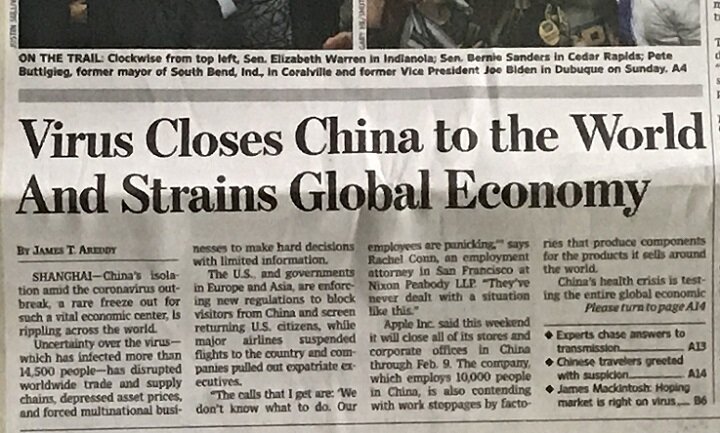The Coronavirus, Uncertainty and Dow 30,000
The coronavirus has become one of the top news stories in the world. It sent markets tumbling last week just as the Dow Jones seemed on its way to hitting 30,000 for the first time. In the media industry, the phrase "above the fold" refers to the front page newspaper headlines that appear above the crease where the newspaper folds in half.
The editors place the day's most important news above the fold so that when you walk out to the end of your driveway and take the newspaper out of its sleeve, these are the first stories you'll see as you walk back into the house. I still get print delivery of the Wall Street Journal each day, so I've watched the coronavirus news creep up from below the fold (last week) to above the fold over the last several days. There's no question that investors are assigning great importance to the news out of China. Just two short weeks ago, much of the investing news focused on the approach of Dow 30,000.
But as the coronavirus spreads, the talk in investing circles has changed to how the quarantines, travel bans and business closures will affect the global economy as China's officials try to get a handle on the situation. After hitting an all-time high of 29,348 on January 17th, the Dow Jones Industrial Average fell over 1,000 points to close at 28,256 by January 31st.We know that the coronavirus is disrupting international trade and supply chains, and that corporations are making difficult decisions in real time with incomplete information. But the long-term impact of such moves is unclear. One could point to the relatively minor market slumps after the SARS outbreak in 2003 as cause for optimism. One could also point out that coronavirus could have a bigger economic impact than SARS did because China's importance to the global economy is greater now than it was in 2003.Investors don't like uncertainty, and the outbreak is adding even more uncertainty to an already unpredictable election year. So what's an investor to do? If you've been reading this blog for any length of time, you know I'm adamant about investing for the long-term, particularly when it comes to stocks.
Regardless of whether we're talking about coronavirus, elections, yield curves or recessions, it is much easier to make a long term plan and implement it than try to guess which way short-term stories are going to play out. It comes down to this: When you invest in stocks, you're buying a company. The company is not just the goods or services they produce right now, but also the new ideas that company will come up with in the future. You're investing in the company's leadership and its ability to navigate periods of uncertainty and adversity. You're investing in the company's ability to adapt. If I think a company can only succeed when the economy is roaring and market conditions are agreeable, I don't invest in that company. I invest in companies that I believe can weather storms and continue to create value for their investors, even when challenging circumstances arise. We will be inundated with bad news for our entire investing life. There is no "All Clear" signal when it's safe to come out of your bunker. If you're always tangled up in the headlines, you'll miss the opportunities that are constantly being created as the world changes. Hang in there, work your plan, and keep a long term perspective.

